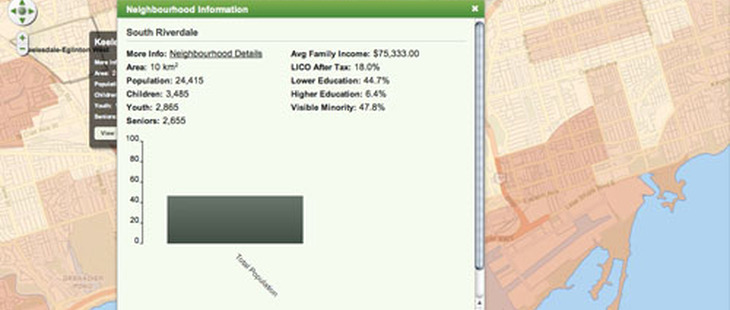
 Screen capture from new Toronto Wellbeing app.
Screen capture from new Toronto Wellbeing app.
The lifeblood of a great city has always been how it makes the good life accessible to as many as possible. But in 2011, that doesn’t just mean giving people community centres, sanitation or easy access to Tim Hortons. It means getting them data. And in this, Toronto may be failing its citizens.
Hundreds of cities across the world are now involved in programs of ‘open data’, which aim to make publicly available the slew of information a city collects. After all, cities are awash with data useful to all of us, whether garbage schedules, crime rates, or when the next bus is coming (naturally, so you can get to Tim Hortons).
In theory, new technology makes getting that information easier than ever. Imagine using the web to search for all public swimming pools with programs for children open after 3 pm, or being able to map out nearby places to get a flu shot. Putting things online and on mobile devices not only spreads information to more people, it makes it more relevant and accessible too.
Is Toronto’s data accessible? The city has made some definite steps toward open data. It recently launched its Toronto Wellbeing site, which lets you see how your neighbourhood fares for a variety of factors, whether population or number of car collisions. And right now, you can log on to the city’s data site and request data of all sorts, whether bikeways or health inspections of restaurants.
But as a recent piece in the Toronto Sun suggested, the problem is that data is only available in its raw form, which commenters on the piece helpfully noted is the “CSV, XML, XLS formats”. In other words, the city’s current approach to open data is a bit like leaving a pile of silicon in Nathan Phillips Square and proudly claiming that anyone in the city can now make a computer, the only plausible response to which is “uh, no”. As William Wolfe-Wylie from the Sun pointed out, it’s hardly accessible when only people with comparatively advanced computer skills can do anything with it. Not helping things is that the open data community gathers around and relies on a volunteer-run site that is frequently down.
To be sure, there are great things that can come from public data and an engaged programmer community. Apps for tracking pollution or helping emergency services have all come from opening data to the public who can then utilize it. But it also means the implementation of data is random at best, and like most things ‘left to the market’, the likelihood the privileged will look after their own is only heightened.
So is the answer, as the Sun suggests, that the city should be the ones to not only release the data, but create websites and apps for the public to use?
Well, no. Or at least, not entirely. The trouble with the perspective is that it centralizes the responsibility for interpreting, crafting and presenting data with one body: the city. Beyond the fact that a certain mayor might consider the millions necessary for this to be gravy, there’s another issue. The web’s most empowering facet is its decentralized nature, the fact that it can collect and aggregate the efforts the thousands of people, if not more. Relying solely on the city would diminish that capacity, and given the creativity and resourcefulness of Toronto’s data community, it would be much to our detriment.
What the city should do is not simply take over authority for data, but work on collecting both its own applications and the work of others in a central place. To wit, don’t centralize the use of data, but do centralize its various implementations. That way, the city lives up to its mandate of serving its populace equally, but doesn’t do so at the expense of the amazing things hackers and programmers can do if just given the right information.














